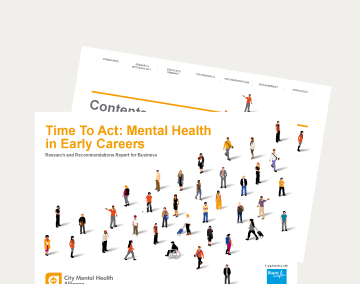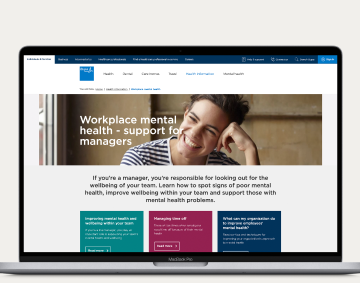Supporting the wellbeing
of young talent

Supporting the next generation of the workforce
Many young people in the workforce are in crisis. Nearly three out of four young professionals are struggling with mental health conditions and 90% expect employers to help support their mental health.1
And new research commissioned by the City Mental Health Alliance (CMHA), in partnership with Bupa, found that almost half (47%) will actively seek out employers who prioritise mental health.2
Workplace wellbeing
This echoes the recent Bupa Global Executive Wellbeing Index, which found that 29% of business leaders aged 18-34 believe an increased focus on workplace wellbeing and mental health will be key to recruiting top talent from now on.3
And attitudes are changing at speed. Research by Milkround, the UK’s largest graduate recruitment platform, has already identified key differences between the expectations and attitudes of Millennials (born between 1980 and 1995) and Generation Z which followed them.4
Just before the pandemic reached the UK, it found that 60% of Millennials were more likely to apply for a position if it included mental health sick days, and this rose to 72% among Gen Zs.5
Higher expectations
Farimah Darbyshire, Head of Programmes and External Relations at CMHA says, “Young people have much higher expectations about getting support and the right environment, and if companies aren't delivering on their promises it will create huge problems in terms of recruitment and reputation.
“Building a mentally healthy workplace, that offers accessible support, is important from a moral point of view, and also from a business perspective. Our research tells us that businesses that get this right will increase retention, recruitment and productivity.”

Head of Programmes and External Relations
City Mental Health Alliance
Sick leave
The extent of the mental health crisis facing managers and leaders of the future is revealed in Time to Act: Mental Health in Early Careers.
Nearly three out of four (72%) have experienced poor mental health in the past year and 20% have taken sick leave because of a mental health condition.6
Almost half (45%) have experienced consistently low mood and two-thirds (61%) say poor mental health has impaired their ability to concentrate at work and do their job ‘well’.7
Ironically, this desire to ‘do well’ — which can drive academic and professional success — may also make some young professionals vulnerable to mental health challenges. Farimah explains, “Needing to achieve, needing to be the best, being scared of failing, imposter syndrome — and the difference between healthy perfectionism and unhealthy perfectionism — is something that we look at a lot.
Unhealthy perfectionism
“Healthy striving for excellence, is when you want to do well, you want to achieve, and it’s very welcome and positive. Unhealthy perfectionism is when this tips over into behaviour that is detrimental to your wellbeing. For example, in healthy perfectionism, if you do something wrong or get critical feedback you say, ‘Right I need to learn from that’. With unhealthy perfectionism you internalise it and think ‘that was a reflection on me as a person’.
Farimah warns, “Wellbeing and mental health has to be given the same sort of consideration that is given to physical health and safety and COVID protocols. If it isn’t, young professionals will move to organisations where it is a priority.
“Sure, salaries are important, but they place a much higher priority on their wellbeing than previous generations.”
Line-manager support
Farimah warns that the extent of mental health conditions among young professionals, and their willingness to seek out organisations which support mental health presents challenges for employers and line-managers.
And this is exacerbated by hybrid working, when there is not the camaraderie of a workplace environment and opportunities for informal support and positive confirmation.
Farimah says it’s not enough for leaders to talk about the importance of mental health, they must also ensure line managers are given the space and skills to provide effective support.
Proactive strategies might include using timesheets to spot when someone is working overly long hours, encouraging people to schedule personal time and setting non-negotiable times, when they are not available for work.
Time to act
Farimah says, “There are three things organisations must do:
- Create a culture of wellbeing and psychological safety
- Create a mentally healthy work environment
- Provide and signpost to accessible mental health resources, tools and support
She adds “We know that when work is designed well, it is good for mental health. People get a sense of achievement, a sense of community, a sense of learning. But resilience is not an unlimited resource, at some point it needs to be replenished.”
Supporting You
Time to Act: Mental Health in Early Careers full report and guidance
For helpful information and advice to support and improve wellbeing, explore our Workplace Mental Health hub
1 https://citymha.org.uk/docs///CMHA-Time-To-Act-Report.pdf (PDF, 1.7MB)
2 https://citymha.org.uk/docs///CMHA-Time-To-Act-Report.pdf (PDF, 1.7MB)
3 Bupa Global Executive Wellbeing Index, UK data
4 https://www.milkround.com/recruiter-advice/mental-health-sick-days-report-by-milkround
5 https://www.milkround.com/recruiter-advice/mental-health-sick-days-report-by-milkround
6 https://citymha.org.uk/docs///CMHA-Time-To-Act-Report.pdf (PDF, 1.7MB)
7 https://citymha.org.uk/docs///CMHA-Time-To-Act-Report.pdf (PDF, 1.7MB)
Bupa health insurance is provided by Bupa Insurance Limited. Registered in England and Wales No. 3956433. Bupa Insurance Limited is authorised by the Prudential Regulation Authority and regulated by the Financial Conduct Authority and the Prudential Regulation Authority. Arranged and administered by Bupa Insurance Services Limited, which is authorised and regulated by the Financial Conduct Authority. Registered in England and Wales No. 3829851. Registered office: 1 Angel Court, London EC2R 7HJ
Bupa Health Trusts are administered by Bupa Insurance Services Limited. Registered in England and Wales No. 3829851. Registered office: 1 Angel Court, London EC2R 7HJ © Bupa 2025




